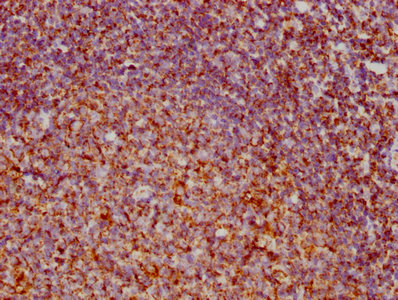BCCIP Antibody
-
中文名称:BCCIP兔多克隆抗体
-
货号:CSB-PA002602GA01HU
-
规格:¥3,900
-
其他:
产品详情
-
Uniprot No.:Q9P287
-
基因名:BCCIP
-
别名:bccip antibody; BCCIP_HUMAN antibody; BCCIPalpha antibody; BCCIPbeta antibody; BRCA2 and CDKN1A interacting protein antibody; BRCA2 and CDKN1A-interacting protein antibody; BRCA2 and Cip1/p21 interacting protein antibody; Cdk inhibitor p21 binding protein antibody; P21 and CDK associated protein 1 antibody; P21- and CDK-associated protein 1 antibody; Protein TOK-1 antibody; Protein TOK1 antibody; TOK 1 antibody; TOK 1alpha antibody; TOK 1beta antibody; TOK1 antibody
-
宿主:Rabbit
-
反应种属:Human,Mouse,Rat
-
免疫原:Human BCCIP
-
免疫原种属:Homo sapiens (Human)
-
抗体亚型:IgG
-
纯化方式:Antigen Affinity purified
-
浓度:It differs from different batches. Please contact us to confirm it.
-
保存缓冲液:PBS with 0.1% Sodium Azide, 50% Glycerol, pH 7.3. -20°C, Avoid freeze / thaw cycles.
-
产品提供形式:Liquid
-
应用范围:ELISA,WB
-
Protocols:
-
储存条件:Upon receipt, store at -20°C or -80°C. Avoid repeated freeze.
-
货期:Basically, we can dispatch the products out in 1-3 working days after receiving your orders. Delivery time maybe differs from different purchasing way or location, please kindly consult your local distributors for specific delivery time.
相关产品
靶点详情
-
功能:During interphase, required for microtubule organizing and anchoring activities. During mitosis, required for the organization and stabilization of the spindle pole. Isoform 2/alpha is particularly important for the regulation of microtubule anchoring, microtubule stability, spindle architecture and spindle orientation, compared to isoform 1/beta. May promote cell cycle arrest by enhancing the inhibition of CDK2 activity by CDKN1A. May be required for repair of DNA damage by homologous recombination in conjunction with BRCA2. May not be involved in non-homologous end joining (NHEJ).
-
基因功能参考文献:
- We analyzed the BCCIP protein level in 470 cases of human breast cancer to determine the associations between BCCIP and 53BP1, p53, and subtypes of breast cancer. We further constructed a unique BCCIP knockdown mouse model to determine whether a partial BCCIP deficiency leads to spontaneous breast cancer formation PMID: 29047390
- BCCIPbeta, as a S7 modulator, contributes to the regulation of ribosomal and extraribosomal functions of S7 and has implications in cell growth and tumor development. PMID: 28510697
- this study identifies BCCIP as a novel factor critical for microtubule regulation and explicates a mechanism utilized by BCCIP in tumor suppression. PMID: 28394342
- Expression of BCCIP beta was notably higher in tumor tissues of esophageal squamous cell carcinoma (ESCC) and Eca 109 cells. In vitro studies such as starvation and refeeding assay along with BCCIP beta-shRNA transfection assay demonstrated that BCCIP beta expression promoted proliferation of ESCC cells. PMID: 27995408
- we demonstrate that BCCIPbeta induces a conformational change within the RAD51 filament that promotes release of ADP to help maintain an active presynaptic filament. Our findings reveal a functional role for BCCIPbeta as a RAD51 accessory factor in HR. PMID: 27694622
- The BCCIPbeta, but not BCCIPalpha, interacts with EIF6 and RPL23/UL14 and stabilizes the latter. PMID: 25150171
- Results indicate that BCCIP germ line mutations are unlikely to be a major contributor to familial breast/ovarian cancer risk in our population. PMID: 23911796
- In BRCA2, two novel frame shift mutations were identified as 5073-5074delCT and 6866delC. PMID: 11748848
- BRCA2 germline mutations appear to have a milder clinical phenotype when compared to non-BRCA2 mutations, since survival is higher among breast cancer patients carrying a BRCA2 mutation compared to sporadic breast cancers. PMID: 11754111
- Unique de novo mutation of BRCA2 has been identified in a woman with early onset breast cancer. PMID: 11836363
- Overexpression of BCCIP beta delays the G1 to S progression and results in an elevated p21 expression PMID: 14726710
- BCCIP is critical for BRCA2- and RAD51-dependent responses to DNA damage and homologous recombinational repair. PMID: 15713648
- BCCIP in maintaining the transactivation activity of wild type p53; down-regulation of BCCIP as a novel mechanism to impair the p53 function in cells harboring wild type p53 PMID: 17135243
- suggest an essential role of BCCIP in the maintenance of genomic integrity PMID: 17452982
- BCCIP-dependent repair of double strand breaks by homologous recombination is an early RAD51 response to ionizing radiation-induced DNA damage. PMID: 18413737
- LYRIC/AEG-1 is a negative regulator of BCCIPalpha, promoting proteasomal degradation either through direct interaction, or potentially through an indirect mechanism involving downstream effects of the NF-kappaB signaling pathway. PMID: 18440304
- BCCIP is phosphorylated by the Src tyrosine kinase and dephosphorylated by the PTPmu tyrosine phosphatase; neurite outgrowth assays suggest that BCCIP and PTPmu are in a common signal transduction pathway. PMID: 18773424
- BCCIP protein expression was not detectable in approximately 45% of all astrocytic tumors. PMID: 19653894
- regulation of p21 intracellular distribution is a new mechanism for BCCIP to modulate p21 functions PMID: 19713748
显示更多
收起更多
-
亚细胞定位:Nucleus. Cytoplasm, cytoskeleton, microtubule organizing center, centrosome, centriole. Cytoplasm, cytoskeleton, spindle pole.; [Isoform 1]: Cytoplasm, cytoskeleton, microtubule organizing center, centrosome. Cytoplasm, cytoskeleton, spindle pole.; [Isoform 2]: Cytoplasm, cytoskeleton, microtubule organizing center, centrosome. Cytoplasm, cytoskeleton, spindle pole.
-
蛋白家族:BCP1 family
-
组织特异性:Expressed at high levels in testis and skeletal muscle and at lower levels in brain, heart, kidney, liver, lung, ovary, pancreas, placenta, and spleen.
-
数据库链接:
HGNC: 978
OMIM: 611883
KEGG: hsa:56647
STRING: 9606.ENSP00000357748
UniGene: Hs.370292
Most popular with customers
-
YWHAB Recombinant Monoclonal Antibody
Applications: ELISA, WB, IF, FC
Species Reactivity: Human, Mouse, Rat
-
Phospho-YAP1 (S127) Recombinant Monoclonal Antibody
Applications: ELISA, WB, IHC
Species Reactivity: Human
-
-
-
-
-
-
VDAC1 Recombinant Monoclonal Antibody
Applications: ELISA, WB, IHC
Species Reactivity: Human, Mouse, Rat




















